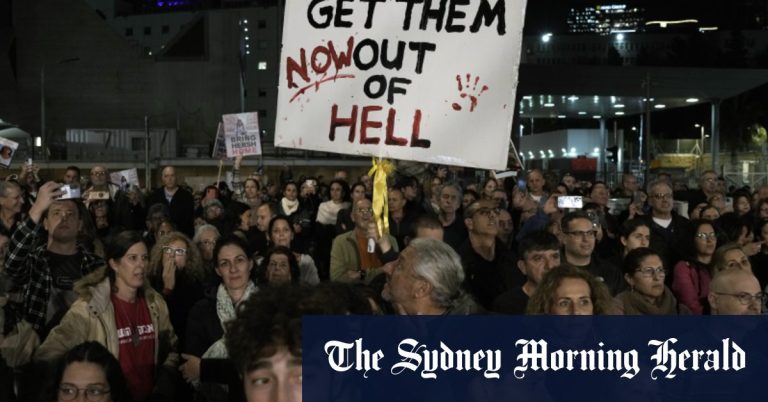Critics accused Netanyahu of preventing a ministerial-level discussion about the post-war scenario in Gaza. They say he is stalling to prevent conflict within his coalition. Netanyahu's office described the claim that it was unnecessarily prolonging the war as “complete nonsense.”
Israel launched its war against Hamas after the movement's unprecedented attack on October 7, which killed about 1,200 people, most of them civilians, in Israel and took about 250 others hostage. Health authorities in the Hamas-controlled Gaza Strip say the Israeli attack has killed nearly 25,000 Palestinians, most of them women and children.

A man holds a sign demanding the release of hostages taken by Hamas activists at a demonstration in Tel Aviv this weekend.credit: AP
The offensive, one of the most devastating military campaigns in modern history, devastated much of the territory and displaced more than 80 percent of its 2.3 million population. United Nations officials said that the Israeli blockade, which allows only a small amount of aid to enter Gaza, has led to widespread hunger and the spread of diseases.
Netanyahu insists that the only way to secure the return of the hostages is to crush Hamas through military means. More than 100 hostages, most of them women and children, were released during a brief ceasefire in November, in exchange for the release of Palestinian women and minors imprisoned by Israel. Israel said more than 130 hostages remain in Gaza, but only about 100 of them are believed to be alive.
Protests grew outside Netanyahu's home in the coastal town of Caesarea, with police removing a small number of attendees, sparking controversy.
“We can't take it anymore. We've been told to sit quietly and let the government do its job. Well, it hasn't gotten us anywhere for the past two months,” said Yuval Bar-On, whose father-in-law, Keith Siegel, was among the hostages.
The protest began when the father of a 28-year-old man detained by Hamas began what he described as a hunger strike. Eli Steffi pledged to eat just a quarter of pita bread a day – the amount some hostages are said to receive on some days – until the prime minister agreed to meet him.
download
At the Tel Aviv protest, former hostage Chen Goldstein-Almog told the crowd: “If we, as a society, as a state, do not do everything, I mean everything, to bring back the abductees, living and dead, then we have no right to exist as a state or as a society.”
Israeli army spokesman Admiral Daniel Hajari said that the army does not carry out attacks in areas where it is known or assumed that there are hostages, and that the army is working “in all possible ways to return them to their homeland.”
Dozens of anti-war demonstrators also gathered in the Israeli city of Haifa, carrying banners reading “Stop Genocide” and clashed with police, who tried to confiscate the banners. The police arrested one person.
As part of its search for the hostages, the Israeli army dropped leaflets on the city of Rafah in the far south of the Gaza Strip. The leaflets, which contained pictures of dozens of hostages, carried a message suggesting benefits for anyone who spoke out.
“Do you want to go home? Please report if you identify someone.”
Hours later, Al-Majd Al-Amni newspaper, a media outlet linked to Hamas' internal security forces, warned Palestinians against providing any information about Israelis being held hostage in Gaza.
The war has spread across the Middle East, with Iranian-backed groups attacking American and Israeli targets. Fighting between Israel and Hezbollah militants in Lebanon threatens to turn into an all-out war, and Iran-backed Houthi rebels in Yemen are targeting international shipping in the Red Sea despite US-led air strikes.
In Gaza, residents who were contacted by phone after a communications blackout for seven days reported violent bombardment and fighting between militants and Israeli forces in and around the southern city of Khan Yunis and the Jabalia refugee camp in the north.
Halima Abdel Rahman, a woman displaced from northern Gaza and now taking refuge in Bani Suhaila on the outskirts of Khan Yunis, said the fighting forced many families to leave their homes, many of which were reduced to rubble.
download
A drone appears to have bombed a car in Rafah, killing four people, according to an AP photographer at a local morgue. The Israeli army did not immediately comment.
In the Israeli-occupied West Bank, mourners gathered for the funeral of Tawfiq Ajaq, a 17-year-old Palestinian-American who was shot dead the previous day near Ramallah. The circumstances of the shooting remain unclear, and police said the incident is under investigation.
AP
Get a direct note from our foreign correspondents on what's making headlines around the world. Subscribe to the weekly What in the World newsletter here.

